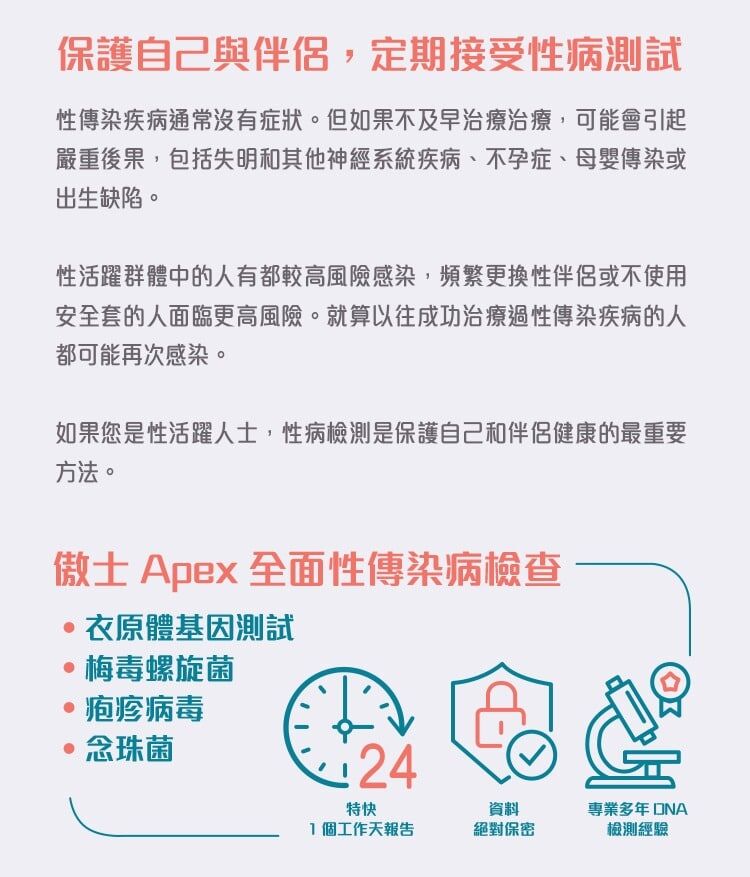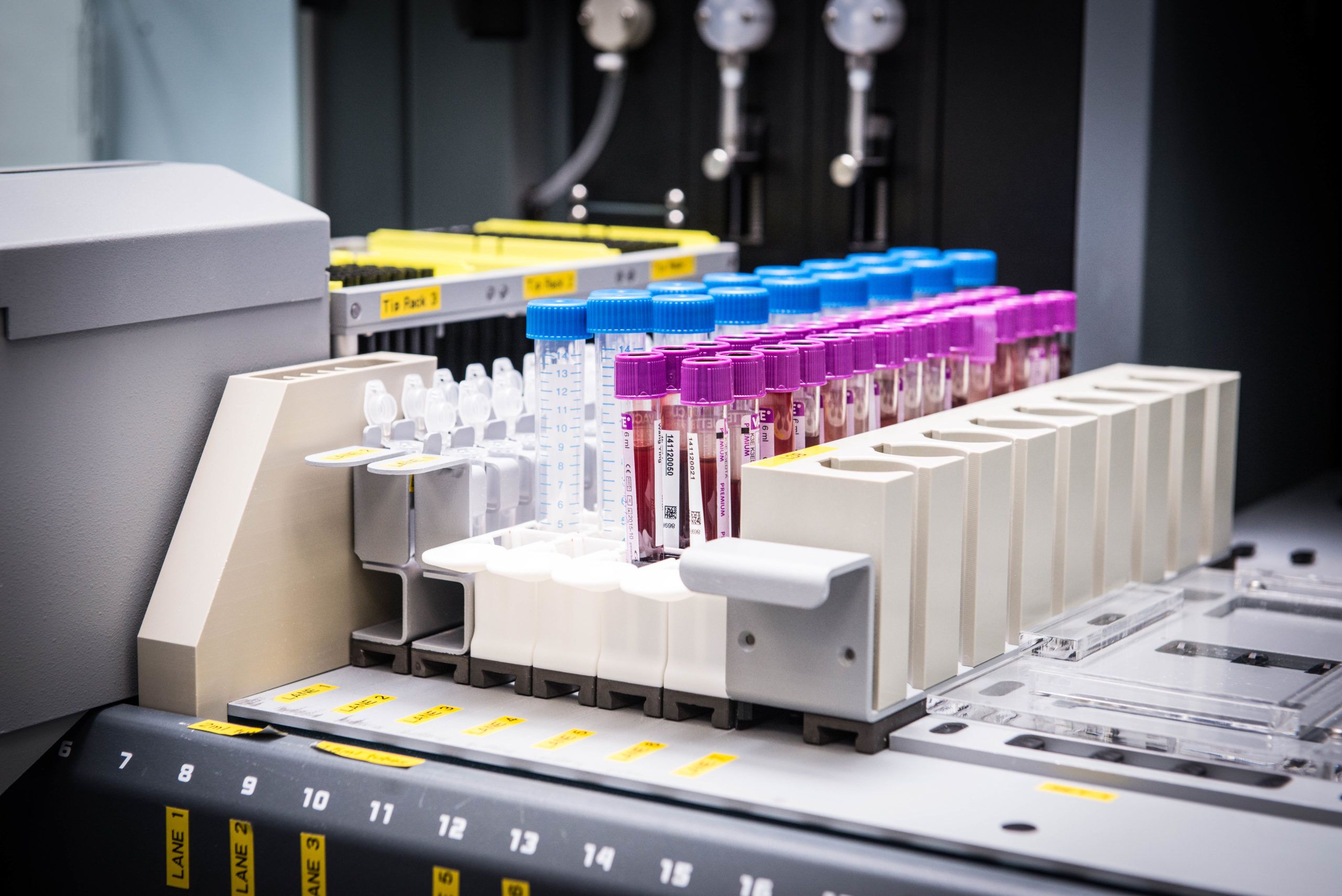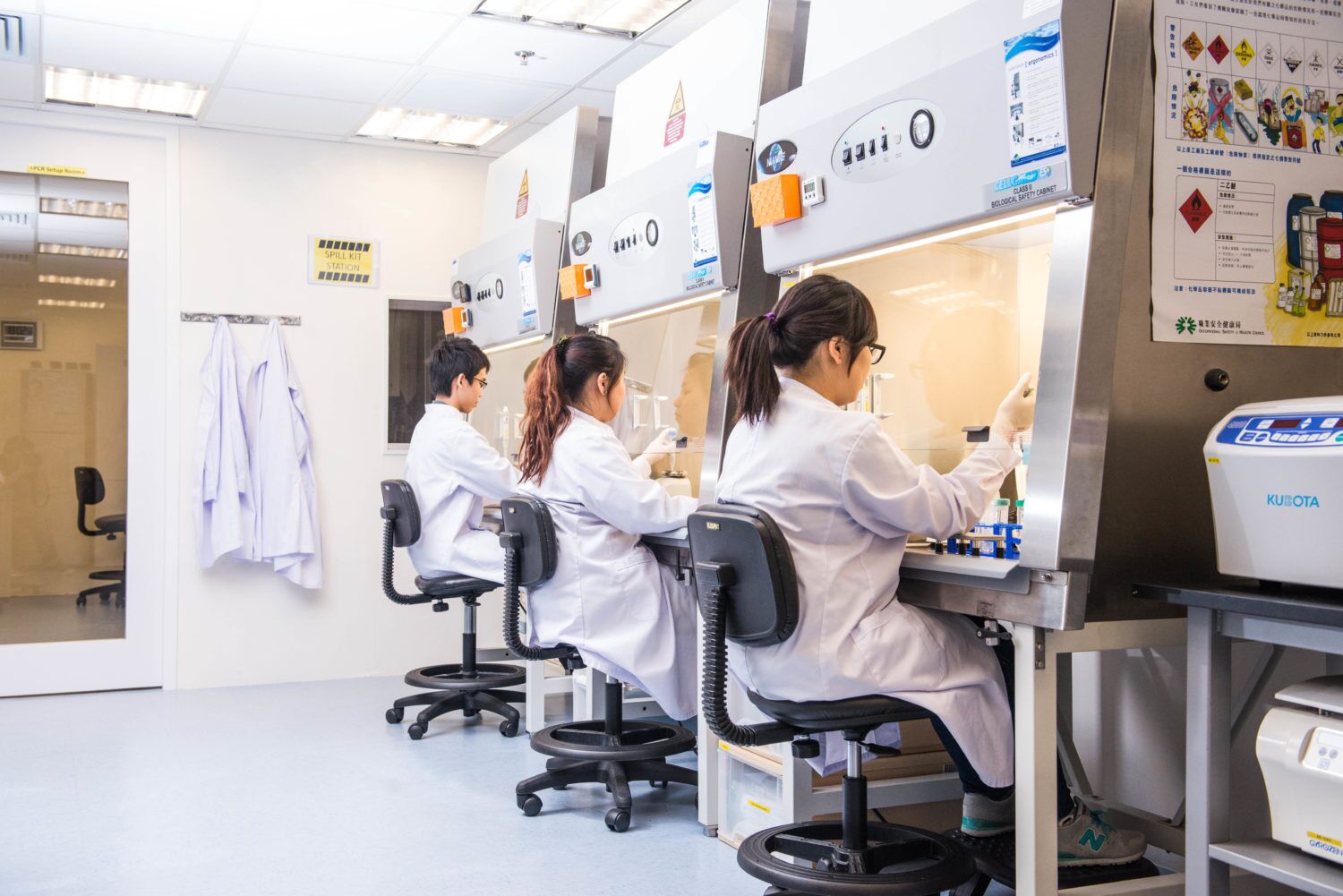No products in the cart.
Sexually Transmitted Diseases Screening [Express 1-2 Working Day Report]
Product: 產品: STD
HK$890 – $2,280
Recommended for
- 18 years old or above
- People who have sex or are suspected of having sexually transmitted diseases, or who do not have symptoms and want to receive the STD examination
Key Checkup Items:
HIV, Syphilis, HPV virus, Chlamydia, Gonorrhea DNA and Herpes Simplex Virus, Trichomoniasis, Candidiasis etc
Sample collection: Urine / Blood / Swab (Female only)
Doctor report interpretation
SKU: STD Categories: Health Check, Sexual Health Tags: Chlamydia, Mycoplasma, STD Screening, STDs, Trichomoniasis
More than 1 million STIs are found every day worldwide, often have no symptoms!
The Importance of Regular STDs Testing: Protecting Yourself and Your Partner
Sexually transmitted infections (STIs), sometimes referred to as sexually transmitted diseases (STDs), often have no symptoms. However, if left untreated there can be serious consequences including blindness and other neurologic manifestations, infertility, mother-to-child transmission or birth defects.
Any sexually active person can catch an STI, those who change partners frequently or do not use condoms are at higher risk. Previous successful treatment for an STI doesn’t make you immune to catching the infection again.
If you are sexually active, getting tested for STDs is one of the most important things you can do to protect your health.
Common STDs Symptoms
Sexually transmitted infections (STIs) refer to diseases that are transmitted through sexual activity. Common examples include gonorrhea, syphilis, genital herpes, and HIV/AIDS.
The most common Sexually Transmitted Diseases (STDs)
Comprehensive Sexually Transmitted Infection (STI) Screening
Basic Sexual Health Check-up Package 10 items
1-2 working days report $890
- Medical Questionnaire
- Chlamydia Trachomatis (CT) DNA
- Gonorrhea DNA
- Ureaplasma Urealytium (UU) DNA
- Mycoplasma Genitalium (MG) DNA
- Hepatitis B Surface Antigen
- Syphilis Ab by RPR
- HIV (1 & 2) Antibody
- HIV P24 Antigen
- Report explanation by Doctor or Medical Professional
Advanced Sexual Health Check-up Package 14 items
1-2 working days report $1,880
- Medical Questionnaire
- Chlamydia Trachomatis (CT) DNA
- Gonorrhea DNA
- Ureaplasma Urealytium (UU) DNA
- Trichomoniasis Vaginalis (TV) DNA
- Ureaplasma Parvum (UP) DNA
- Mycoplasma Hominis (MH) DNA
- Mycoplasma Genitalium (MG) DNA
- Treponema pallidum (TP)
- Syphilis Ab by RPR
- Hepatitis B Surface Antigen
- HIV (1 & 2) Antibody
- HIV P24 Antigen
- Report explanation by Doctor or Medical Professional
Comprehensive Sexual Health Check-up Package 23 items
3 working days report $2,280
- Medical Questionnaire
- Chlamydia Trachomatis (CT) DNA
- Gonorrhea DNA
- Ureaplasma Urealytium (UU) DNA
- Trichomoniasis Vaginalis (TV) DNA
- Ureaplasma Parvum (UP) DNA
- Mycoplasma Hominis (MH) DNA
- Mycoplasma Genitalium (MG) DNA
- Treponema pallidum (TP)
- Herpes Simplex Virus I (HSV 1)
- Herpes Simplex Virus II (HSV 2)
- Candida Albicans
- Gardnerella Vaginalia (GV) DNA
- Hepatitis B Surface Antigen
- Hepatitis B Surface Antibody
- Hepatitis C Antibody
- Venereal Disease Research Laboratory (VDRL) Test
- Treponema pallidum haemagglutination Test
- Syphilis Ab by RPR
- HIV (1 & 2) Antibody
- HIV P24 Antigen
- HPV DNA Genotyping Test
- Report explanation by Doctor or Medical Professional
Express 2 Working Days Report
Understandable test results help you understand your own health condition.
Test Procedures
Collect samples
Blood drawn at our center, and provide urine or swab samples.
Test results
Report in 1-2 working days earliest via email
How to use
- Urine Test: Recommended to collect the sample of your first morning urine on the day. If necessary, customers could collect urine sample bottle at the center before testing.
- For male, use blood test, urine for STD pathogens DNA detection.
- For female, use blood test and vaginal swab (by self-sampling) for STD pathogens DNA detection.
- Please do not use during pregnant and during period.
- Those with obvious symptoms should ask a doctor for sampling assistance.
TEST PROCEDURE
- Wash hands thoroughly with soap and water before the sample collection
- To prevent the contamination of the urine sample on the penis or vagina, clean the urethra or around the vulva with the towelettes before urinating
- If it is necessary to collect head portion of the urine, the process should be avoid the contamination. Customers can collect urine sample bottle at our medical center before sampling
- Avoid touching the inner part of the sample bottle when you are taking sampling o prevent bacteria from your hands from contaminating urine specimen
- Seal the sample bottle containing the urine sample carefully to prevent leakage, and put it into the sample bag.
More STDs Information
Syphilis
What causes it?
The bacterium called Treponema pallidum causes it.
What are the common symptoms?
According to the clinical manifestations at different stages. There are three different stages of syphilis and symptoms are similar for men and women.
Primary stage:
A painless sore (called a chancre) appears at the site of infection approximately 10-90 days after contact. The sore may appear on any part of the body, usually on the penis or vulva, but sometimes the sore will not be noticed, especially in women when the sore is inside the vagina.
Secondary stage:
During this time, a person may develop non-itchy rash on the palms of the hands, soles of the feet, the belly or the genitals. There may also be some flu-like symptoms. The symptoms in this stage will disappear in a few weeks even without treatment. However, this does not mean that the patient has recovered. In fact, the bacteria are still lurking inside the body.
Latent stage:
Tertiary stage (months to years):
The bacteria continue to invade the brain, the spinal cord and the heart, causing blindness, paralysis and even death.
Disregard of the disease stage, improperly treated pregnant woman can transmit the disease to the unborn baby, leading to serious consequences.
Incubation period
There may be no symptoms at all and is usually not contagious during this stage.
What test do I do if I have syphilis?
You need to be examined by a doctor and could use microscopic examination of the material from the sores or blood tests. The person(s) you have had sex with should also be tested for the disease.
Chlamydia
What causes it?
The bacterium called Chlamydia trachomatis causes it which is the most common cause of non-gonococcal urethritis.
What are the common symptoms?
In many cases, there are no noticeable symptoms for chlamydia
, but when symptoms appear, they are similar to those of gonorrhoea.
For men, the most likely symptoms are:
- A discharge from penis
- Pain or burning feeling while passing water
- Need to pass water more often
- Irritation or an itching feeling inside the penis
For women, possible symptoms are:
- A slight increase in vaginal discharge
- Pain or burning feeling while passing water
- Need to pass water more often
- Irregular periods
- Pain during sex
How do I find out if I have chlamydia?
You need to be examined by a doctor. Chlamydia can be diagnosed by a swab taken from place which may be infected, or by a urine sample. Your sexual partner must also be tested for the disease.
Human Immunodeficiency Virus (HIV)
What causes it?
The virus called Human Immunodeficiency Virus (HIV) causes it. HIV can be transmitted through:
- Direct sexual contact with someone who has HIV
- Sharing injecting equipment and personal items such as razors or toothbrushes that are contaminated with HIV infected blood
- A mother with HIV to her baby during pregnancy or at birth
What are the common symptoms?
An HIV carrier may is often asymptomatic and cannot be identified by any external features. AIDS can take up to 15 years to develop after the infection with HIV. At the very beginning, the infected person may experience:
- Flu-like symptoms
- Fever
- Weight loss
- Fatigue
- Swollen glands
What are the effects?
Over a long period of time, the immune system becomes severely damaged. Eventually the immune system is unable to prevent the development of serious illnesses including rare forms of pneumonia and skin cancer. Successive opportunistic illnesses eventually lead to death.
HPV Virus
HPV Virus DNA Genotyping 28 Types
Detects 28 common HPV viruses (18 high-risk and 10 low-risk viruses), including the main culprits of cervical cancer (such as HPV 16 and 18) and HPV viruses that can cause genital warts (commonly known as cauliflower) (such as HPV 6 and 11). papillomavirus (HPV) is a common sexually transmitted virus that can cause a variety of diseases, including genital warts and cancer. HPV virus DNA genotyping includes 28 different HPV virus DNA genotypes, which can be divided into “high-risk” and “low-risk.” High-risk HPV: HPV types 16 and 18 can cause cancer such as cervical cancer, vulvar cancer, vaginal cancer in women, and penile cancer, “oropharyngeal cancer” and “anal cancer” in men. Low-risk HPV viruses usually do not cause cancer, but they can cause genital warts.
HPV DNA testing has high sensitivity and accuracy, can detect HPV virus in the early stage, and can also cover most high-risk types of viruses that cause cervical cancer. Using HPV virus gene testing technology, it is possible to detect sexually transmitted diseases that cannot be detected by traditional HPV testing methods. Early treatment and monitoring before the virus develops further abnormalities can help prevent the formation of cervical cancer.
Non-gonococcal Urethritis
What causes it?
This is the most common cause of non-gonococcal urethritis. A number of organisms can cause it.
What are the common symptoms?
Men may experience the following symptoms:
- A urethral discharge that may be more noticeable first thing in the morning
- Pain or a burning sensation when passing water
- Irritation of the penis
What are the regular complications?
NGU may recur. A recurrence may be triggered by excessive friction during sex, or drinking too much alcohol.
If inadequately treated or not treated, serious complications may occur although they are rare. These include:
- Inflammation of the testicles
- Reduce fertility
- Reiters syndrome which causes inflammation of the eyes, joints and urethra
Herpes Genitalis
What causes it?
This can caused by the virus called Herpes simplex II
What are the common symptoms?
Both men and women may have one or more symptoms, including:
- Tingling or itching in the genital or anal area
- Cluster of tiny fluid-filled blisters. These blisters burst and leave painful sores
- that last from two to three weeks.
- A flu-like illness like headache, backache, swollen glands or fever
- Painful urination if it passes over any of the open sores
Hepatitis B
Hepatitis B Surface Antigen
A unique set of proteins on the surface of the hepatitis B virus. A positive result indicates that the virus is latent in the body, and it can be determined whether the patient is infected with the hepatitis B virus.
Hepatitis B Surface Antibody
An antibody produced by the immune system against the hepatitis B surface antigen protein. A positive result indicates that there are antibodies in the body. For those who have never been vaccinated but have antibodies, it means that they have been infected but have fully recovered and have lifelong immunity.
COMMON QUESTIONS
Different STIs have vary by the type of symptoms, some may have no symptoms in some cases, and some symptoms may be particularly difficult to detect. Common symptoms of STIs include:
- Abnormal genital discharge from penis
- Vaginal odor
- Pain or discomfort during urination
- Genital rash, ulcers, blisters, or warts
- Genital itching or irritation
- Blisters or sores in or around the mouth
STIs can be transmitted through skin-to-skin contact and bodily fluids, so any type of sexual activity can potentially lead to an STI, including vaginal sex, anal sex, oral sex, manual stimulation, intimate skin-to-skin contact, and sharing sex toys. Therefore, it is recommended to use protective measures such as condoms.
No, you can still get infected with an STI again after being infected! Herpes and HIV are lifelong infections, while other STIs such as chlamydia and gonorrhea can be cured. There is no immunity after being infected with an STI, and if you have sexual contact with an infected person, you may get infected again.
You should get tested for STIs as soon as possible if found any of the following situations:
- Having multiple sexual partners
- Having sexual contact with someone who has or is suspected to have an STI
- Engaging in unprotected sex, without condom or experiencing condom broke during sex
- If you have suspected STI symptoms or have been diagnosed by a doctor to receive timely treatment
- Having new/multiple sexual partners should get tested annually
- Having new/multiple sexual partners should get tested annually
In order to test STD, blood taking for antigen and antibody detection is commonly used in the market. ApexHealth provides comprehensive DNA screening for STDs. Compared with antigen and antibody tests, DNA detection not only offers a higher sensitivity and accuracy, but also shortens the testing time.
Benefits of DNA Testing:
- Require small amount of STD sample
- Accuracy and sensitivity higher than ag/ab test
- Detect multiple STIs simultaneously
Notices
General Health Check
- *The results will be displayed in the appendix with the health check test reports for reference only
- #It is only applicable to people aged 30-75 and those who have not had any previous cardiovascular disease.
- ^Not applicable to individuals with a prior liver condition, weight ≥160 kg, and age ≤40 (women) or ≤35 (men), on medications to lower triglycerides or with inherited hypertriglyceridemia.
- Breast cancer risk assessment is only limited for women aged 44-69 to evaluate their risk of developing breast cancer.
- Customers undergoing a medical examination must be at least 18 years of age or older. (For those who are under 18 and would like to perform Health Check Services, they must be accompanied by their parent(s) and sign the consent form)
- No eating or drinking or taking of any drug within 8 hours before the examination (Except plain water).
- Please do not smoke or drink any alcohol and caffeine drinks before the test.
- Pregnant ladies, or any members who are suffering from bleeding disorders or receiving anti-coagulant therapy are advised to consult his/her medical doctor prior to receiving the services.
- Urine test: Collect the middle portion of 15ml urine stream in the clean container before the test.
- Stool test: Stool size should be walnut or 1-inch ball in the clean container within 24 hours before the test or can get the special stool container in our testing centre. (It is important that no urine or toilet water mix with the stool sample).
STD Health Check
- Abstinence for at least 24 hours before the test is recommended. Avoid cleaning up your genital in the test day morning.
- Avoid visiting the bathroom 2 hours before the test.
- Ladies in menstruation is not suitable for urine test.
- Urine Test: Recommended to collect the sample of your first morning urine on the day.
Ultrasound Scan
- Pelvis U/S Scan: Have full bladder prior to examination.
- Please inform our staff of confirmed/ suspected pregnancy.
DNA Genetic Test
- Recommended that do not eat or drink (nothing should be placed in the mouth except water) for 1 hour prior to the test.
Terms and Conditions
- Customers must present their identity cards and the order confirmation letter on the appointment day.
- The service purchased is valid for two months (from the date of purchase) or it will be forfeited.
- **Offer cannot be used in conjunction with other promotional offers.
- No cancellation is acceptable once an order is confirmed.
- Service items may change without prior notice. In case of dispute, ApexHealth reserves all rights.
- For any enquiry, please call our customer services hotline at (852) 3504 2738.
- Disclaimers: All health check/health screening services are not for the purpose of medical diagnostic or therapeutic purposes. When there is any sign of symptom/disease in your health, please consult Doctor immediately for diagnosis and treatment.
| STD Plan | 10 items, 14 items, 23 items |
|---|
Related products
-8%




